Education Keeps Growing
Whether you have been involved with PHS on a patient or professional level, you’ve almost certainly come across materials and resources the education department provides. Creating learning tools for such a wide variety of therapies, equipment, supplies, and cares is no small task. But, this versatile group develops the tools to ensure staff, family members, and other health care professionals are well versed and comprehensively trained to provide the best care for each child. Whether that comes in the form of classes, written materials, competency testing for PHS staff, or venturing into new territories, this team does it all.
Educating Caregivers
Plan Language Materials
- Understanding that many of our parents had no background in medical care prior to having a medically-complex child, our educational materials contain instructions on using equipment and medicine, written in simple terms. This helps ensure that parents feel confident and knowledgeable as they care for their child.
Classes for Families and Health Care Professionals
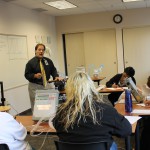
- Free classes are always available for family members and PHS employees to expand their knowledge and gain more training in the care they provide for their child. These classes are also available for health care professionals not with PHS for a fee. Classes are led by respiratory therapists and certified infusion nurses, and covers topics including ventilators, IV basics, Bilevel/CPAP, and more. You can check out the upcoming classes here.
- A home care tip is included with each order delivered to a patient’s home. Created monthly, these tips range from advice for preventing illness to avoiding holiday supply shipment delays. Look for the bright slip of paper in your next order!
Training for New Nurses
- To ensure new private duty nurses are thoroughly trained before entering a patient’s home, each nurse spends five days completing training and education from PHS staff, some of which includes classroom instruction. Beyond these five days, nurses are also trained according to what their patient’s specific needs are — this might include anything from food pumps and ventilators to central lines and tracheostomy care.
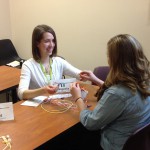
- Additionally, the education department continues to create learning blocks for on-site staff and PDNS nurses to complete during the orientation process — a step in testing competencies for all staff.
Ensuring User Ease
Improving Layout
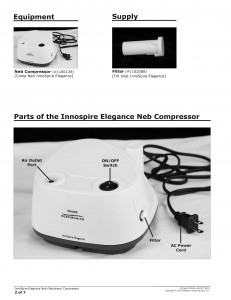 Recently, the written education created by PHS has been revised to be more user friendly, thanks to the help of Krystal Culliton, BA, RRT-NPS, and Cathleen Urbain, PH.D. After recognizing the positive impact reviewing the layout of educational materials could have, an in-house audience met to evaluate the materials in different layouts and formats, deciding what led to the most clarity in understanding the equipment or care.
Recently, the written education created by PHS has been revised to be more user friendly, thanks to the help of Krystal Culliton, BA, RRT-NPS, and Cathleen Urbain, PH.D. After recognizing the positive impact reviewing the layout of educational materials could have, an in-house audience met to evaluate the materials in different layouts and formats, deciding what led to the most clarity in understanding the equipment or care.
Improving Photographs
- The education department recently worked to produce even more reader friendly education materials by improving the photographs. Brie Cohen, the Education Publications Coordinator, got together with PHS clinicians to boost the clarity and quality of the images to help patients and caregivers better understand how to use their equipment.
Tracking Primary Languages
- With the help of our patient advocate, Cathleen Urbain, PHS continues to annually monitor primary languages within the 7-county metro area as well as our patient population to determine if our materials need to be translated into any additional languages. If it is determined that a new language needs to be included after consideration and analysis, pieces are written clearly first in English and critical pieces are translated. Currently, some education is translated into Spanish, Hmong, Somali, Vietnamese, and Russian.
Collaboration for Safe Care
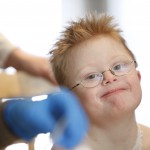 Parents work with a number of companies, hospitals, and health care professionals to coordinate their child’s care because we know consistency is key to ensuring success. That’s why our education department works with hospital staff to make sure any changes to how we’re teaching is communicated to them, and vice versa. This ensures our training is consistent, no matter where the family is receiving care.
Parents work with a number of companies, hospitals, and health care professionals to coordinate their child’s care because we know consistency is key to ensuring success. That’s why our education department works with hospital staff to make sure any changes to how we’re teaching is communicated to them, and vice versa. This ensures our training is consistent, no matter where the family is receiving care.
Coming Up: How-To Videos
- To incorporate another form of education for families, Rebecca Long explains “our goal is to provide a suite of videos on our website that walks caregivers through how-to’s. We have a group of feeding videos we wanted to create, and are currently working on those first. Then we have several others in line, covering topics such as how to care for an IV catheter, how to apply an oximeter probe, how to work with a humidifier, how to troubleshoot a suction machine.”
Brie Cohen works alongside nurses, respiratory therapists, dietitians, and any other project specific team members to turn written materials and videos into a cohesive, comprehensive format to serve as a resource for families.
Currently, the department is working to quantify the number of troubleshooting calls and exchanges that are done and can’t be verified to determine topics that will rank highest on their list of videos to create, in hopes that these videos will provide families another resource alternative. Watch for the first video to go up on the PHS website soon!
As PHS education grows and helps patients and families travel through their journey, one thing is certain— everyone will keep learning. Our team will continue to stay up to date on best practices, will develop relevant educational materials, and provide classes to help everyone be as knowledgeable on equipment and cares as possible. We listen to what our families need and create items based around those suggestions— we’re always here to help. If you have an idea for an educational video or resource, feel free to send us a message on our Facebook page or e-mail Rebecca Long directly at ralong@pediatrichomeservice.com.
Originally published: October 25, 2013


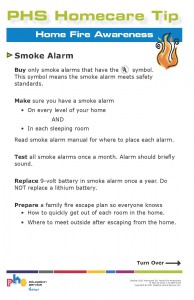
![Infection Prevention Methods Poster [Spanish]_Page_1](https://www.pediatrichomeservice.com/wp-content/uploads/2013/10/Infection-Prevention-Methods-Poster-Spanish_Page_1-150x150.jpg)